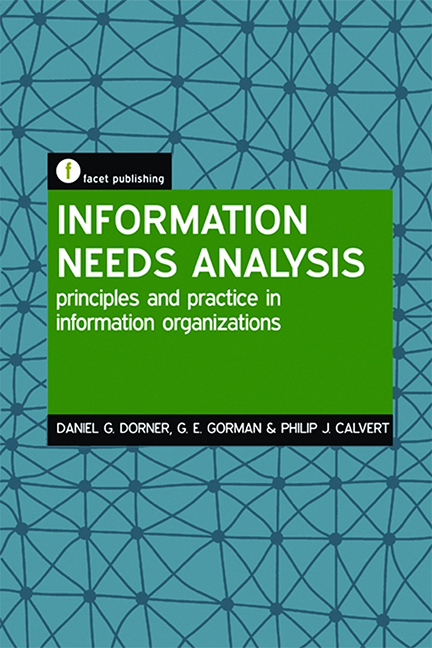Book contents
- Frontmatter
- Contents
- List of figures and tables
- List of scenarios
- About the authors
- Preface
- 1 Background to needs analysis for information managers
- 2 The importance of context in information needs analysis
- 3 Models and types of information needs analysis
- 4 The stages of information needs analysis
- 5 Gathering data for information needs analyses
- 6 Gathering data from existing sources
- 7 Gathering data through surveys
- 8 Gathering data through interviews
- 9 Analysing and integrating information needs analysis data
- 10 Reporting on an information needs analysis
- Bibliography
- Index
8 - Gathering data through interviews
Published online by Cambridge University Press: 10 September 2022
- Frontmatter
- Contents
- List of figures and tables
- List of scenarios
- About the authors
- Preface
- 1 Background to needs analysis for information managers
- 2 The importance of context in information needs analysis
- 3 Models and types of information needs analysis
- 4 The stages of information needs analysis
- 5 Gathering data for information needs analyses
- 6 Gathering data from existing sources
- 7 Gathering data through surveys
- 8 Gathering data through interviews
- 9 Analysing and integrating information needs analysis data
- 10 Reporting on an information needs analysis
- Bibliography
- Index
Summary
Introduction
In Chapter 5 we provided an overview of the main methods for gathering the data required for an INA in different information management contexts. In this chapter we look specifically at the use of individuals and groups as a source of data in INAs.
The main questions driving this chapter are:
♦ What is the value of gathering data from individuals in an INA?
♦ What are the main methods of qualitative data collection?
♦ How do focus groups function?
♦ What are the uses of observation in data gathering?
We thus begin by explaining the value of using individuals and groups in INAs, and then we describe the main methods of qualitative data collection, especially the use of focus groups.
Those familiar with qualitative research will find that it is relatively easy to transfer qualitative methods they have used in research to an INA. Both are processes for enquiry that gather data from the perspectives of the subjects of the investigation (or from key individuals who interact closely with the subject group) in order to help the investigator form a better understanding of what is happening and recommend improvements to the current situation. Both assume that meaning can be found in the context of relevant events, actions and interactions, which in the academic world would place most qualitative research in the interpretive paradigm. Both assume that the best way to understand such events and actions is through close engagement with people most directly involved in those events and actions. Further, both approaches assume that we can gather rich data from those most closely involved by talking with them or actually watching them while they are involved in the events of relevance to the INA.
Some aspects of qualitative research are not present in INA: often the investigator is not looking for ‘new knowledge’ to present to the world, nor is there necessarily any theory building involved. Given these points, it is somewhat paradoxical that the best definition we can find for qualitative methods for INA happens to come from a research methods text (thankfully, in this definition there is no reference to theory or any of the other elements commonly associated with academic research):
- Type
- Chapter
- Information
- Information Needs AnalysisPrinciples and Practice in Information Organizations, pp. 161 - 188Publisher: FacetPrint publication year: 2017



